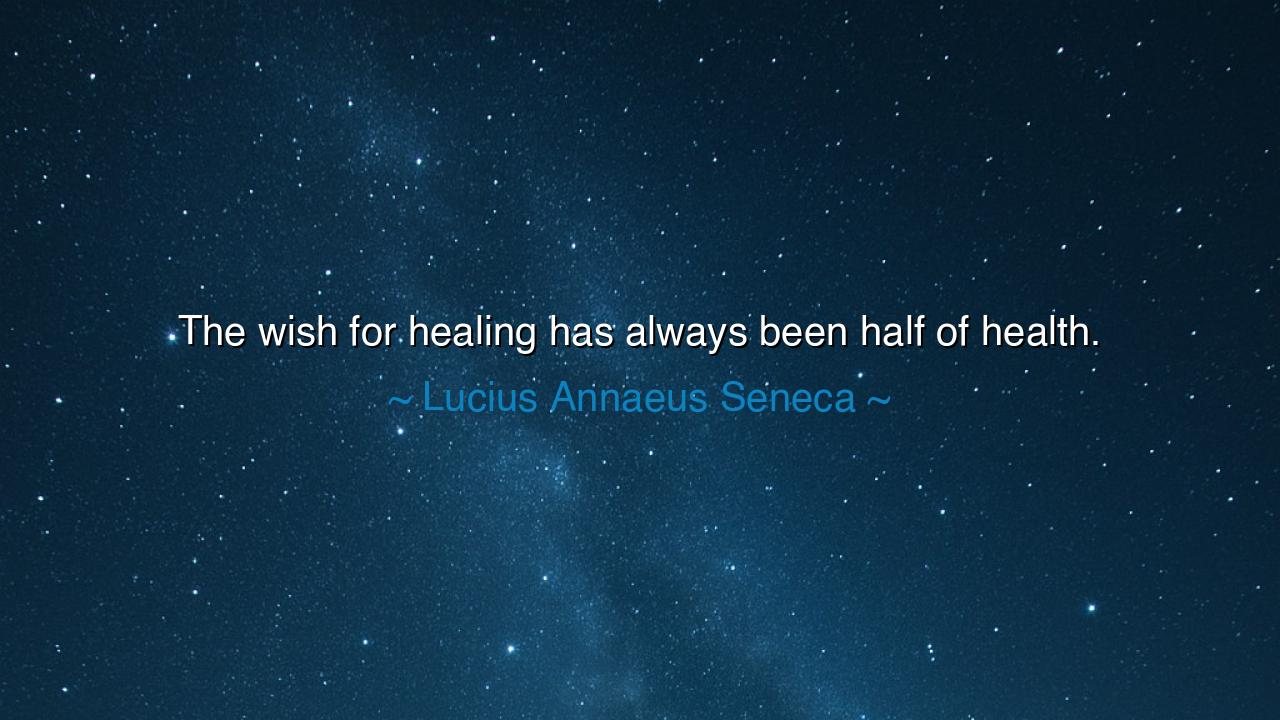
The wish for healing has always been half of health.






“The wish for healing has always been half of health.” Thus spoke Lucius Annaeus Seneca, the great Stoic philosopher of Rome — a man who understood the storms of the soul as well as the frailty of the flesh. In these few words, he revealed one of the deepest truths of human existence: that the desire to be whole, the yearning to be restored, is itself the beginning of healing. For within the heart that wishes to rise lies already the power to stand; within the mind that seeks light, the dawn has already begun to break.
Seneca lived in an age of grandeur and decay — an empire adorned with marble, yet heavy with corruption and excess. Amid this world of noise and spectacle, he taught that the greatest victory was not in conquest, but in self-mastery. He saw that health was not merely the strength of the body, but the harmony of the soul. To those consumed by grief, anger, or despair, he offered this wisdom: that to wish for renewal, to truly desire peace, is to awaken the inner physician. For no remedy, no medicine, no divine aid can heal one who does not wish to be healed.
In the days of the ancients, the sick would journey to the temples of Asclepius, the god of medicine. There they would sleep and dream, and the priests would interpret their visions as the voice of healing. Yet before any cure could begin, the sufferer had to come with faith — not faith in ritual, but in the possibility of recovery. Seneca’s insight flows from this same river of thought: that hope is the first spark of vitality. The wish for healing calls forth life’s forces; it stirs the will, sharpens the spirit, and opens the gate through which recovery enters.
Consider the story of Nelson Mandela, imprisoned for twenty-seven years, his body weakened but his will unbroken. In the darkness of his cell, he nurtured the quiet flame of purpose — the wish not only to survive, but to heal his nation from hatred. That wish became his strength, his health in the midst of confinement. When freedom came, he did not emerge bitter, but whole. His body had endured hardship, but his spirit had long been in the process of healing. Thus Seneca’s truth endures across centuries: to wish for healing is already to reclaim life’s power from despair.
For there are two illnesses in every person: the sickness of the body and the sickness of the spirit. The first may come through chance, but the second comes when the heart abandons hope. Seneca teaches us that the battle for health begins in the unseen realms — in thought, in desire, in belief. A man who despairs, even when surrounded by physicians, cannot be cured; but one who hopes, even in solitude, has already begun his ascent. The mind, once turned toward restoration, aligns the body to follow.
The Stoics held that life’s wounds, though painful, are also teachers. They believed that suffering refines the soul, shaping it into wisdom and strength. To wish for healing, then, is not to flee from pain, but to embrace it as part of the process — to say, “I am not yet whole, but I will be.” In this wish lies courage, humility, and faith — the very virtues that build the foundation of lasting health.
So, dear seeker, remember this eternal teaching: the journey toward healing begins not in the body, but in the will. The herbs of the earth and the hands of healers can aid you, but their power is multiplied a hundredfold when the spirit joins in. To wish for health is to call your strength back to yourself. To wish for healing is to declare, “I am not defeated.” Even in weakness, that wish is victory.
Practical actions for the seeker: When illness or sorrow visits you, do not sink into despair. Instead, kindle within your heart the wish for healing, however faint. Speak it aloud — let your soul hear your intention to live. Surround yourself with what restores peace: clean food, fresh air, kind words, silence, and prayer. Write your pain, walk among trees, breathe deeply — each act a form of wishing, each wish a step toward wholeness. For as Seneca taught, the moment you desire to heal, half your health has already returned — and the rest will surely follow, borne on the wings of hope.






AAdministratorAdministrator
Welcome, honored guests. Please leave a comment, we will respond soon